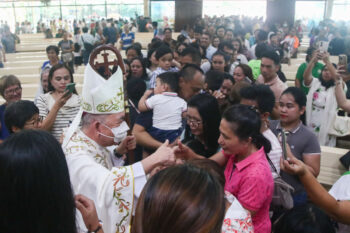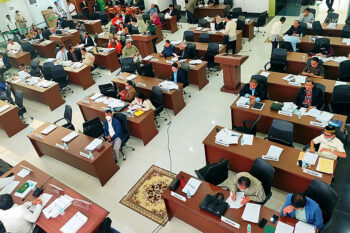
MARAWI CITY (MindaNews / 01 April) — Transitional Justice and Reconciliation (TJR) is an integral aspect of the Annex on Normalization and is a prime feature of the Comprehensive Agreement on the Bangsamoro (CAB). This will benefit the Moro people and essentially glues together the entire Government of the Philippines – Moro Islamic Liberation Front (GPH-MILF) peace agreement.
The Transitional Justice – Dealing with the Past (TJ-DWP) framework is seen as a critical strategy that could address not only the legacies of serious human rights violations, marginalization, land dispossession, and historical injustices committed against the Bangsamoro but also as a direct response to challenges being faced by the Marawi Internally displaced Persons (IDPs) or the ‘bakwits’ since the siege of this Islamic City on May 23, 2017. And the quest for transitional justice is what underpins the long struggle for self-determination of the Bangsamoro people.
For most of civil society and the peacebuilding community working closely with the IDPs in the BARMM, the issue of displacement, especially one that is driven by armed-conflict, is a ‘TJ-able’ issue. Transitional justice measures, in this sense, must respond to the justice claims of the IDPs by addressing the bakwits’ most pressing needs, redress for the victims and their families, and by supporting their advocacy for durable solutions.
Since 2018, the Marawi IDPs, in partnership with various civil society organizations, have been calling for a “voluntary, safe, and dignified return” to Marawi or Kambalingan in Meranaw.
To fulfill Marawi’s real recovery and rehabilitation, the government should start not with rebuilding the public buildings devastated by the siege but by rebuilding the lives of the people of Marawi including their homes. The IDPs’ call for Kambalingan must be of paramount importance to achieve healing and justice for the victims and their families.
Who are the IDPs if they are unable to return? For the IDPs, their identity, faith, way of life and culture are linked to their right to return and reintegrate with their communities. Unfortunately, the government has repeatedly postponed the Kambalingan and has no concrete, if not disparate policies and timeframe to address the continuing displacement as thousands of IDPs remain in squalid temporary shelters struggling with the onslaught of economic and social dislocation.
It has been almost six years since the tragic siege destroyed the lives and future of the Meranaws. The Marawi IDPs have been demanding answers for this prolonged displacement but it seems that the national government, including relevant agencies, are too preoccupied with the beautification of Marawi, painting a rosy picture of progress that can’t be felt by IDPs and the Meranaws. A stadium, three mosques, three barangay centers, roads have been built and traffic lights installed but almost no one from the original residents have ever used them.
Between 2017 and 2023, Marawi IDPs were compelled to relocate almost ten times in search of stable housing and a means of subsistence. During these periods, they frequently encountered secondary and tertiary displacement events like flooding, fires, evictions, volcanic eruptions, and the COVID-19 lockdowns.
Justice for those who died and are still missing due to the siege remains unresolved. The precise number of deaths among civilians has not yet been determined while in the Maqbara public cemetery, most of the graves remain unidentified.
Another issue is the ongoing land confiscation and displacement that is taking place in Marawi. Four barangays including Sabalamanao, Datu sa Dansalan, Dansalan, and Datu Naga, have been forced to be displaced permanently. For us, what is happening in Marawi is tantamount to land grabbing with the government as the clear perpetrator. The IDPs have been stripped of their rights to their own lands.
Last March 14, to highlight the call for a safe and dignified return within a transitional justice framework as a solution to the IDP’s situation in Marawi, various IDP communities and civil society groups held a Transitional Justice Summit at the Mindanao State University.
The Summit starkly showed that almost six years after the tragic Marawi siege, the city and its people are still striving to get back on their feet. IDP representatives shared their stories of day to day challenges living in the temporary shelter communities including persistent pleas addressed to concerned government agencies and representatives that were present during the Summit.
Although there have been efforts from both the national and local governments as reported by their various representatives who were present, Marawi’s issues and post-siege challenges remain to be a transitional justice concern for most of the participants, especially the IDPs.
One thing is clear, the IDPs themselves must be accorded meaningful participation in the planning and actual implementation of the whole Marawi rehabilitation and reconstruction process, because this will concretely define their future.
While being resilient in the face of a displacement crisis is one commendable and highly adaptive trait, resilience must not be employed as a comfortable excuse not to immediately deliver justice and recovery packages for the victims of the siege and the IDPs.
Rebuilding Marawi should mean rebuilding homes and providing livelihood necessary for the safe and dignified return of the IDPs to their beloved city. Six years after the siege, our question remains: When will the residents of Marawi be allowed to come home? Only then can we truly rebuild our lives. Kambalingan!
(MindaViews is the opinion section of MindaNews. Tirmizy Esmail Abdullah is a professor of Mindanao history in the Department of History in the College of Social Sciences and Humanities at Mindanao State University in Marawi City, Philippines. He currently serves as the program coordinator for MSU Marawi’s doctoral and master program in Philippine Studies. He is also designated as the program officer for peace research at the Institute for Peace and Development in Mindanao (IPDM), MSU Marawi. Prof. Tirmizy is actively involved in various civil society platforms including the Marawi Advocacy Accompaniment (MAA), which was formed at the height of the Marawi siege. He has been working for interreligious dialogue, social justice, peacebuilding, nonviolence, environmental protection and human rights).







